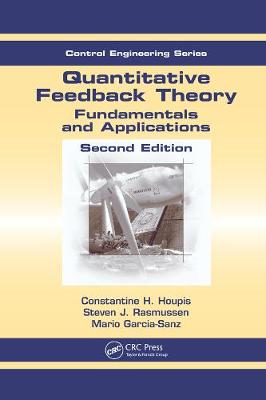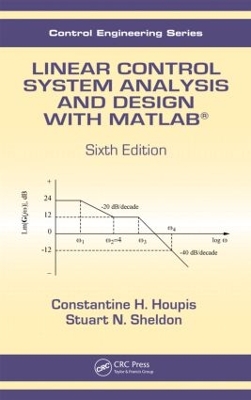Automation and Control Engineering
5 total works
Linear Control System Analysis and Design
by Constantine H. Houpis, Stuart N. Sheldon, and John J. D'Azzo
Linear Control System Analysis and Design with MATLAB (R), Sixth Edition
by Constantine H. Houpis and Stuart N. Sheldon
Thoroughly classroom-tested and proven to be a valuable self-study companion, Linear Control System Analysis and Design: Sixth Edition provides an intensive overview of modern control theory and conventional control system design using in-depth explanations, diagrams, calculations, and tables.
Keeping mathematics to a minimum, the book is designed with the undergraduate in mind, first building a foundation, then bridging the gap between control theory and its real-world application. Computer-aided design accuracy checks (CADAC) are used throughout the text to enhance computer literacy. Each CADAC uses fundamental concepts to ensure the viability of a computer solution.
Completely updated and packed with student-friendly features, the sixth edition presents a range of updated examples using MATLAB (R), as well as an appendix listing MATLAB functions for optimizing control system analysis and design. Over 75 percent of the problems presented in the previous edition have been revised or replaced.
Quantitative Feedback Theory
by Constantine H. Houpis, Steven J. Rasmussen, and Mario Garcia-Sanz
The first edition of Quantitative Feedback Theory gained enormous popularity by successfully bridging the gap between theory and real-world engineering practice. Avoiding mathematical theorems, lemmas, proofs, and correlaries, it boiled down to the essential elements of quantitative feedback theory (QFT) necessary to readily analyze, develop, and implement robust control systems. Thoroughly updated and expanded, Quantitative Feedback Theory: Fundamentals and Applications, Second Edition continues to provide a platform for intelligent decision making and design based on knowledge of the characteristics and operating scenario of the plant.
Beginning with the fundamentals, the authors build a background in analog and discrete-time multiple-input-single-output (MISO) and multiple-input-multiple-output (MIMO) feedback control systems along with the fundamentals of the QFT technique. The remainder of the book links these concepts to practical applications. Among the many enhancements to this edition are a new section on large wind turbine control system, four new chapters, and five new appendices. The new chapters cover non-diagonal compensator design for MIMO systems, QFT design involving Smith predictors for time delay systems with uncertainty, weighting matrices and control authority, and QFT design techniques applied to real-world industrial systems.
Quantitative Feedback Theory: Fundamentals and Applications, Second Edition includes new and revised examples and end-of-chapter problems and offers a companion CD that supplies MIMO QFT computer-aided design (CAD) software. It is the perfect guide to effectively and intuitively implementing QFT control.
Linear Control System Analysis and Design with MATLAB®
by Constantine H. Houpis and Stuart N. Sheldon
Thoroughly classroom-tested and proven to be a valuable self-study companion, Linear Control System Analysis and Design: Sixth Edition provides an intensive overview of modern control theory and conventional control system design using in-depth explanations, diagrams, calculations, and tables.
Keeping mathematics to a minimum, the book is designed with the undergraduate in mind, first building a foundation, then bridging the gap between control theory and its real-world application. Computer-aided design accuracy checks (CADAC) are used throughout the text to enhance computer literacy. Each CADAC uses fundamental concepts to ensure the viability of a computer solution.
Completely updated and packed with student-friendly features, the sixth edition presents a range of updated examples using MATLAB®, as well as an appendix listing MATLAB functions for optimizing control system analysis and design. Over 75 percent of the problems presented in the previous edition have been revised or replaced.


